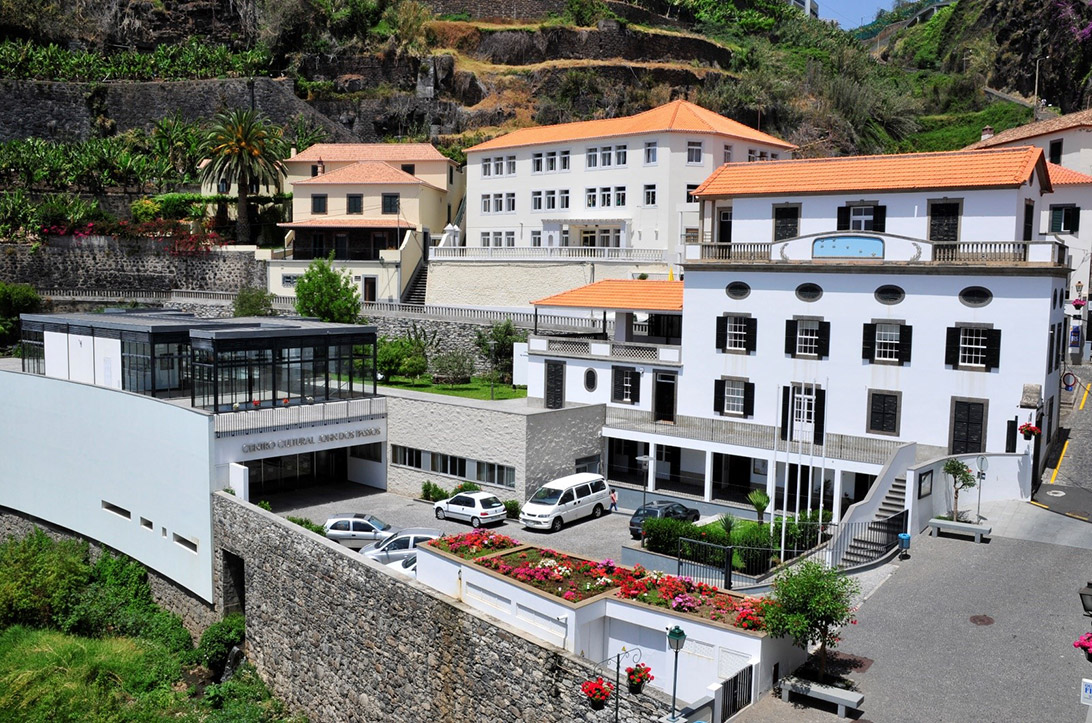
The John Dos Passos Cultural Centre was inaugurated on 20 September 2004, in a ceremony chaired by the President of the Regional Government of Madeira and attended by Lucy Dos Passos Coggin, Rodney Coggin and Lara Dos Passos Coggin, respectively, the daughter, son-in-law and granddaughter of the American writer who descended from an immigrant from Ponta do Sol.
The property, acquired by the Regional Government of Madeira in 1996 from Maria Amália Pitta Telles, heiress and last owner of the Villa Passos, who was residing in Venezuela at the time, was subject to a delicate restoration process, but maintains the original architecture from the late 1930s, when it underwent the most recent changes by its last tenant, her father Dr. Fortunato Pitta.
The John Dos Passos Cultural Centre – a building constructed in the first half of the 19th century – is located right in the heart of Ponta do Sol and constitutes a symbol of the built and historic heritage of the village.
Villa Passos, in Ponta do Sol, belonged to family members of Manuel Joaquim Dos Passos, born in 1812, the paternal grandfather of John Dos Passos, who emigrated to the United States in 1830, where he raised a family.
It is now a cultural institution.
CASA-MÃE
The house that now hosts the John Dos Passos Cultural Centre was owned by the writer’s family in the 19th century. In addition to a library, we can also visit two museum areas in this space, and a permanent exhibition about the life and work of the writer John Dos Passos.
JOHN DOS PASSOS
The writer John Dos Passos was born in Chicago in 1896. The grandson of a Ponta do Sol native, he always showed interest and pride in his Madeiran roots throughout his life, having visited the island of Madeira in 1905, 1921 and 1960. His latest book entitled “The Portugal story: three centuries of exploration and discovery” is a tribute to his origins.
LIBRARY
The Library of the John Dos Passos Cultural Centre is composed of a varied collection of books, both thematically and by nationality of the authors. We can also find periodicals, non-book material and even some Braille books in this space. Most books can be borrowed. This collection currently contains around 6,000 books, all having been donated by several public entities, specifically the United States Embassy in Lisbon, the Luso-American Development Foundation (FLAD), among others, and by individuals such as Lucy dos Passos Coggin, the daughter of the writer John Dos Passos, and Maria do Carmo da Cunha Santos, the primary donor.
RESERVED BOOKS ROOM
It is in this room that the most important monographic collection is concentrated. We can find all of the bibliographical works of the writer John Dos Passos translated into several languages. These works are for consultation in person.
19TH CENTURY BEDCHAMBER The 19th century bedchamber of Manuel Joaquim Dos Passos is one of the museum spaces that can be visited. Here we will find different objects and pieces of furniture that transport us to another time.
19TH CENTURY KITCHEN The kitchen follows the early 19th century style. It is composed of typical utensils from Madeiran culture, such as a bread trough, a wooden tray, which was used in the past for serving food, oil lamps, iron pots and a "cuscuzeiro", used to make couscous. In addition to these objects, it is possible to find a collection of Sacavém crockery in the windowed cabinets, which adds a touch of elegance to the kitchen. In this kitchen, which is very typical of the region, we are given a glimpse of the tradition of bread kneading, in the wood oven that has been in the kitchen since its construction, through images which show the various procedures until its final process.
AUDITORIUM
The auditorium of the John Dos Passos Cultural Centre annually hosts the most varied activities. From music to theatre, conferences, seminars and school activities. It has an annual average of 20,000 visitors.
Great names of Portuguese theatre have performed here, such as Ruy de Carvalho, Marina Mota, Ana Bola and Florbela Queiroz.
It has a capacity for 180 seats.
Credits: 600 Anos da Madeira e Porto Santo

